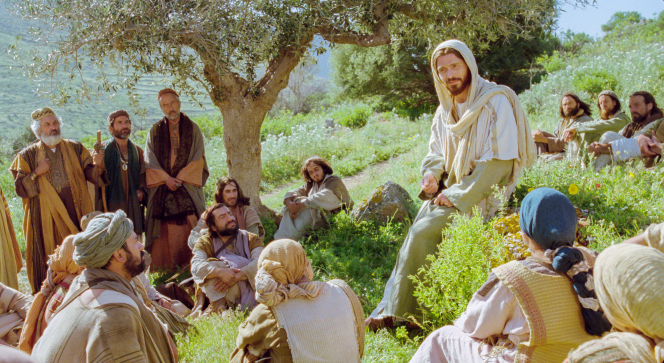Can We Covet and Still Have an Attitude of Gratitude?
“Comparison is the thief of joy,” said the late President Teddy Roosevelt (and just about every poster in my high school English classrooms).
Even though I’ve heard this quote approximately 40 billion times (only a slight exaggeration), it still rings true to me because it’s honestly pretty obvious when you break it down: when we compare, we’re jealous. And when we’re filled with jealousy, we’re certainly not happy.
I recently had a friend pose a question that caused me a great deal of introspection: can we have an attitude of gratitude and still be envious of others?
My knee-jerk reaction was “Of course. I’m a pretty grateful person, but that doesn’t mean I wouldn’t kill for Sandra Bullock’s jawline.”
Okay, disclaimer: I wouldn’t actually kill for it. But you get the point.
After thinking about it a little more, I realized that having an attitude of gratitude is being grateful for what you do have, not jealous of or upset about what you don’t have. So my final answer, Regis, is no. We can’t be envious and jealous and still grateful.
And initially realizing that made me a little upset because I do think I’m grateful. But then I had to ask myself WHY it made me upset.
It made me upset because I realized I would need to change.
Parables on Jealousy
 I’ll be honest: there are two parables I’ve always struggled with in the New Testament. Maybe you can guess what they are, because chances are you may have struggled with them too.
I’ll be honest: there are two parables I’ve always struggled with in the New Testament. Maybe you can guess what they are, because chances are you may have struggled with them too.
The parables of the prodigal son (more specifically, the tale of his brother) and the laborers in the vineyard.
And guess what? They both boil down to pride and its brother, envy.
Luckily, Elder Jeffrey R. Holland has given talks on both allegories because he’s psychic. Or more likely, because the Spirit prompted him that a lot of us need a little help with these particular sins that keep us from having a full-time attitude of gratitude.
First let’s start with the parable of the prodigal son. As a quick recap, the prodigal son takes his inheritance from his father and “wastes his substance with riotous living.” The son realizes he’s made a huge mistake and returns to his father, who embraces him with open arms.
I’m nearly positive that few of us have a problem with that. We understand and accept the principle of forgiveness. We yearn for it to be extended to us. Yet when we consider the prodigal’s brother, we begin to see the situation as perhaps a little unfair.
When their father throws a party because his wayward son has returned, the faithful older son feels slighted. He addresses his father in a less-than-happy manner, venting his frustrations. He’s always been a good son. He hasn’t done anything wrong and has been faithful to his father, working hard to please him. So why hasn’t his dad ever thrown HIM a party? Surely he’s more deserving of one.
So just let that simmer for a bit while we move on to the second parable of the laborers in the vineyard.
I’ll make this summary short and sweet: a man hires several laborers early in the morning to tend to his vineyard. They agree to a certain wage, and he honors it. However, as the day goes on, he hires more and more laborers. Then, at the last hour of the day, he hires even MORE laborers. And guess what they get, these men who worked only the last hour as opposed to the entire day like the other men? The exact same wage.
If you’re anything like me, your brain probably at some point has screamed, “That’s not fair! The laborers that have been there all day worked way longer. They deserve more!”
Or perhaps concerning the story of the prodigal son, “The son who stayed with his father should have a party thrown for him, too. After all, he’s been the faithful one; the good one! He deserves it!”
But consider Elder Holland’s statement concerning “the other prodigal”: “One who has heretofore presumably been very happy with his life and content with his good fortune suddenly feels very unhappy simply because another has had some good fortune as well.”
Similarly, he reflects on the earliest laborers’ jealousy that they have been dealt the same wage as the men who got there later. He relates this envy to us, stating, “Obviously we suffer a little when some misfortune befalls us, but envy requires us to suffer all good fortune that befalls everyone we know!”
Both parables are alike in that the men feel envy because of the good fortune of another. So how exactly does that relate to gratitude?
When the prodigal son’s brother became jealous that his previously wayward brother is receiving kind treatment and love, is he feeling gratitude for the good life that he has had? For not having to suffer and feel foolish as his brother did? Is he feeling grateful that his brother has returned? Is he reflecting on the happiness of his father at the return of one of his beloved sons?
Definitely not.
As the earlier laborers in the vineyard suggested that they had been short-changed by receiving the same wage as the later laborers, were they pondering about how grateful they were to have work? Were the earlier laborers thinking about how lucky they were to have been chosen early in the day, to have had a sense of security all day in knowing that they were providing for their families?
No. They weren’t feeling grateful because they were instead consumed by jealousy and a false sense of injustice.
It’s as simple as this: jealousy robs gratitude.
Overcoming Jealousy

It’s clear that feelings of jealousy and gratitude cannot co-exist… So how do we overcome envy?
The same friend who posed the question to me about an attitude of gratitude confided in me a struggle she had previously with regards to envy. And her method of overcoming it was nothing short of ingenious.
“I used to covet and envy other girls’ beautiful legs. Finally I decided I had to be willing to trade for the whole package, not just the one physical trait I envied. That cured me. There are not many gals with gorgeous legs that have no other challenges.”
I love that. In a world full of television, billboards, magazines, and social media, it’s so easy to compare ourselves to others, which usually leaves us feeling jealous and perhaps even a little bitter. But when we do feel that way, we’re not considering the whole package.
Yes, the prodigal son had a party thrown for him. But he also had to deal with a whole lot of repentance, shame, and sorrow. And okay, maybe the later laborers in the vineyard only had to work for an hour as opposed to the men who had worked all day. But the later laborers were plagued all day with the realization that they wouldn’t be able to feed their families that evening. They were forced to watch good fortune befall everyone except them all day!
Neither the prodigal son’s brother nor the earlier laborers in the vineyard stopped to consider the whole package. They just thought about the good that was coming to someone else and automatically assumed that they were being slighted and deserved more.
So maybe next time you find yourself feeling jealous, widen your perspective. Increase your vision. Think about what you’re grateful for.
Stop to remind yourself that your mind doesn’t have room for an attitude of gratitude AND an attitude of jealousy and covetousness.
You only have space for one, and I personally recommend choosing the attitude of gratitude. Because long legs may be nice to have, but an attitude of gratitude is a whole lot better.


